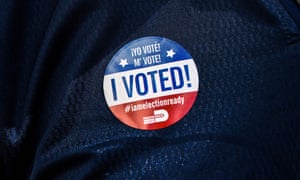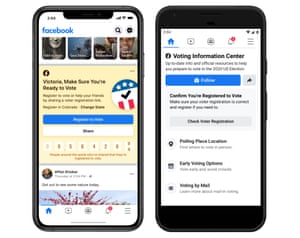Firm aims to double number of registered voters of previous drives and prevent ‘malicious’ interference

Photograph: Chandan Khanna/AFP/Getty Images
Facebook will launch “the largest voting information effort in US history” in the run-up to November’s general election, the company has said, aiming to help 4 million Americans register to vote with a new voting information centre.
That goal, spread across Facebook, Instagram and Messenger, is double the number of voters registered as a result of its previous drives, in the 2016 and 2018 elections. The company is also hoping it can prevent a repeat of the foreign interference that plagued the last US presidential election.
“We’ve built some of the most advanced systems in the world to combat election interference,” said Naomi Gleit, Facebook’s vice-president of product management and social impact. “The Voting Information Center will be another line of defence. By getting clear, accurate and authoritative information to people, we reduce the effectiveness of malicious networks that might try to take advantage of uncertainty and interfere with the election.”
Facebook is also making an unprecedented concession to those worried about the effect of targeted political advertising on the site. The company will continue to take such ads, and allow advertisers to use all its standard targeting tools, but individual users will now be able to turn off all social issue, electoral and political ads, removing them wholesale from Facebook products.

Facebook will also finally show who paid for a political ad for even after it has been shared by another user, and will begin tracking ad spend on a candidate-by-candidate basis, to “help you understand how much advertisers and candidates are spending to reach voters”.
When it comes to less forthright attempts to influence the vote, Facebook hopes its moderation team will help. Since 2016, the company says, it has tripled the number of people working on “security and safety issues”. The company’s experience of “more than 200 elections since 2017” will also help, Nick Clegg, Facebook’s vice-president for global affairs and communications, wrote in a comment piece for the Telegraph. “I’ve seen with each election we’ve got better and better at defending the integrity of the democratic process,” Clegg told the Today Programme on Wednesday morning.
“In 2016, I think everybody in a sense got it wrong because no one was aware at the time what the level and sophistication of Russian interference would be,” he added. “It was the first time that foreign organised adversaries were trying, through social media platforms like Facebook, to interfere in an election”.
Facebook’s primary goal is to encourage people to vote, says founder Mark Zuckerberg. “I believe Facebook has a responsibility not just to prevent voter suppression – which disproportionately targets people of colour – but also to actively support well-informed voter engagement, registration and turnout,” he wrote in USA Today on Wednesday.
The drive comes as Facebook has suffered unprecedented internal turmoil over its decision not to take down a Donald Trump post that many of its own employees believed to be inciting violence, a decision that Clegg refused to directly support on Wednesday. Asked multiple times whether he agreed with the choice to leave the post up, Clegg demurred, ultimately arguing that his role in the decision-making process carried a similar sort of collective responsibility to his previous position in the UK cabinet.
Without referring directly to the controversy, Zuckerberg argued that that decision too showed the company’s commitment to electoral freedom.
“Free expression is part of the messy process of democracy, and we take our responsibility to protect it incredibly seriously,” he wrote.
“Everyone wants to see politicians held accountable for what they say – and I know many people want us to moderate and remove more of their content. We have rules against speech that will cause imminent physical harm or suppress voting, and no one is exempt from them. But accountability only works if we can see what those seeking our votes are saying, even if we viscerally dislike what they say.”
The voting information centre will appear at the top of the Facebook and Instagram feeds, starting this summer, and will contain guidance on how to vote, including advice on registration, information on postal voting, help on the process of voting in person, and posts from local election authorities with announcements about any changes to the process.




